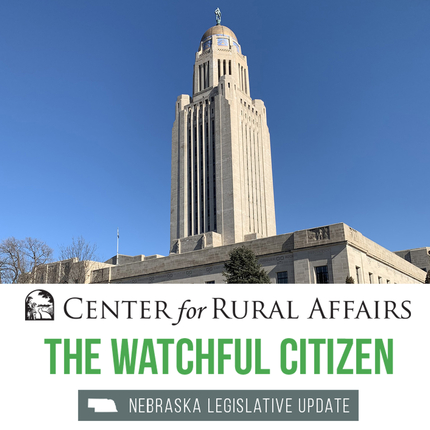By Tim Mussack, former staff member
Last week, the Legislature approved budget bills in Legislative Bills 1011, 1012 and 1013. On Monday, Gov. Pete Ricketts signed and made line item vetoes to all three of them. Reductions were made to workforce housing, Department of Health and Human Services (DHHS) provider rate increases, capitol building construction, prison vocational life skills training, and a recreational trail project between Omaha and Lincoln. The Center’s two general budget priorities in LB 759 and LB 1090 were not a part of the governor’s line-item vetoes.
The funding reduction to DHHS provider rates includes nursing facility payments under the Medicaid program. In Nebraska over 50% of nursing home residents are on Medicaid. This funding increase is needed to help nursing and assisted living facilities recruit and retain staff members. Staff shortages are a major cause of closures, in 2021 four rural nursing homes closed in Nebraska. A veto override motion has been filed by Sen. John Stinner.
State senators need to hear directly from their constituents on this important issue. The veto override vote is expected to happen this week, so a call or email to your representative is important. Click here to find your senator.
The American Rescue Plan Act spending bill, LB 1014, is currently on final reading. The Center’s priority in LB 755 remains intact.
This week, senators will work late most days as they only have eight working days left in the session. The final day to debate general file bills is this Friday, April 8.
A tax cut plan moved from select file to final reading yesterday. The provisions can be found in LB 873. An attempt to provide more tax relief for middle income families failed. Currently tax cuts in the bill include a the phasing in of full tax exemption of all Social Security income, the phasing in of a lowering of the state’s top personal and corporate income tax rates to 5.84%, setting the minimum level of the refundable income tax credit on school property taxes paid at $560 million, and creating a new refundable income tax credit for community college property taxes paid.
A veto override vote on LB 1073 failed yesterday by one vote. This bill would have required the state to accept the $120 million in federal funds already set aside for Nebraska to extend the Emergency Rental Assistance Program (ERAP) into the year 2025. Because of the state's inaction ERAP will end in September for 91 counties. Omaha and Lincoln are expected to receive $70 million of the $120 million to fund their own rental assistance programs.
We value your input as we engage with the legislative process. If you would like to share your support, concerns, insights or opposition by providing testimony in-person, via letter or by visiting with your senator, please do not hesitate to contact me at [email protected] or 402.687.2100 ext. 1032.
Food and agriculture
LB 755 (Brandt)—Support: This Center for Rural Affairs legislation, introduced by Sen. Tom Brandt, would provide $10 million for the Independent Processor Assistance Program, which was established last year with the unanimous passage of LB 324. Funding would come from State Recovery Funds from the federal American Rescue Plan Act. This bill would help local processors secure additional space, equipment, and staffing to keep up with the demand created by changing consumer preference and work interruptions at regional packing plants. That is especially important to livestock producers, who continue to have a difficult time scheduling locker dates.
Gov. Pete Ricketts’ ARPA spending plan includes $10 million for small- to medium-sized meat processors which mirror’s LB 755. This bill received great support in the Feb. 9 hearing with an estimated 12 people testifying in support and no neutral or opposition testimony.
As of March 31, funding for the Independent Processor Assistance Program has been included in LB 1014 which is currently on final reading.
Read: Center says funding will create healthy future for rural Nebraska
LB 925 (Gragert)—Support: Creates the Resilient Soils and Water Quality Act, which seeks to accelerate the use of best practices for healthy soil management, improve water quality, and protect public health while also protecting agricultural production and profitability. The Center supports and encourages any effort in pursuit of retaining or restoring soil health and water quality, both of which are crucial to keeping our people and land productive and healthy.
This bill was heard on Jan. 26 by the Natural Resources Committee. The Center submitted a statement in support. The bill was prioritized by Sen. Tim Gragert.
As of March 10 this bill is on final reading.
Read: Peer discussions, reliable resources key in adopting soil health practices
Health and safety
LB 697 (Kolterman)—Support: This bill provides for licensure of Rural Emergency Hospitals (REH). In December 2020, Congress passed the Consolidated Appropriations Act of 2021, which created a new Medicare provider type called the Rural Emergency Hospital. The REH will be a new rural hospital type that does not provide inpatient care, rather 24-hour emergency services. The REH comes as a response to an ongoing period of hospital closures in rural communities and to address the concerns about access to emergency services in rural areas. Rural health outcomes are important to the Center and we believe REHs can help fill the gap our communities need when responding to medical emergencies.
This bill was heard by the Health and Human Services Committee on Jan. 20 and was placed on general file on Feb. 1 and select file on March 9.
This bill was placed on final reading as of March 31.
LB 905 (Walz)—Support: This bill allows the Board of Medicine and Surgery to craft policies with accredited hospitals and licensed health care professionals to ensure that screening for maternal mental health disorders occur using a validated tool at prenatal and postnatal visits, as well as well-child checkups. Nebraska’s greatest resource is its people. Healthy mothers and babies are critical to the future success of our state, particularly in aging rural communities. Every undiagnosed and untreated case of maternal depression can lead to lasting negative impacts for rural families and communities.
This bill was heard by the Health and Human Services Committee on Jan. 19 and was placed on general file on Feb. 1 and select file on March 16.
This bill is on final reading as of March 31.
LB 929 (Wishart)—Support: This bill requires the submission of a Medicaid state plan amendment or waiver to extend postpartum coverage from 60 days to 12 months. Extending postpartum coverage to one year is important to addressing the continuing needs of mothers, as more than half of pregnancy-related deaths happen postpartum and 12% occur after six weeks postpartum. The bill will also increase the financial viability of rural health care services: Medicaid paid for an estimated 50 to 60% of births in rural areas in 2017. Extending coverage for new mothers would ensure the necessary follow-up care and provide a further financial incentive for maintaining obstetric services in rural settings.
Referred to the Health and Human Services Committee. Hearing held Jan. 26.
LB 1091 (Dorn)—Support: This bill creates the Nebraska Nursing Incentive Act, which seeks to alleviate the nursing shortage in Nebraska. This program would provide $5 million toward scholarships to Nebraska residents who agree to work in the state as licensed practical nurses or nurse aides for a period of two years. Rural residents face access to care challenges that are worsened by the current healthcare workforce crisis. This bill would help curb the current nurse shortage that is expected to grow to 5,000 by the year 2025.
This bill was heard by the Health and Human Services Committee on Feb. 11. The Center submitted a letter of support to the committee. As of Feb. 28 this bill is on general file.
LB 1201 (DeBoer)—Support: This bill would allocate $20 million in funding to nonprofits who focus on food distribution and $20 million to food security innovation grants that will decrease Nebraska's reliance on national supply chains. The COVID-19 pandemic has made food insecurity a real problem for many Nebraska residents. This bill will alleviate immediate need and provide resources that strengthen the state’s future food security. If funded, this money would represent 4% of the total state ARPA budget and would likely be the only money allocated toward direct food assistance and projects intended to reduce food insecurity.
This bill was heard by the Appropriations Committee on March 2. The Center provided testimony in support.
The Appropriations Committee has recommended funding of $10 million for direct food distribution and $10 million for food security innovation projects.
As of March 31, the Appropriations Committee recommendation in LB 1014 has been amended to be $17.5 million for direct food assistance and $2.5 million for food innovation grants.
Education
LB 721 (Hilkemann)—Support: Appropriates $60 million in State Recovery Funds for the University of Nebraska Medical Center Rural Health Complex. This new facility will be located on the campus of the University of Nebraska at Kearney (UNK) and will focus on educating healthcare professionals who will work in rural hospitals and clinics. The Center supports this bill because we believe it will help in the recruitment and retention of rural healthcare professionals.
Gov. Pete Ricketts’ recommendations include $10 million for a rural health complex.
This bill was heard by the Appropriations Committee on Feb. 17. The Center submitted a letter of support.
The Appropriations Committee has recommended funding of $60 million toward building the Rural Health Complex at UNK in LB 1014.
LB 758 (Brandt)—Support: Amends the Nebraska Farm-to-School Program Act to include early childhood education programs. Created last year under LB 396, this statewide program is administered by the Nebraska Department of Education. It promotes connections between local farmers and schools to procure fresh, locally grown food for school meals. In the interest of providing students with fresh, healthy food and opening a new market to local producers, the Center supports this bill.
Hearing was held Jan. 18, by the Education Committee. No testimony was provided in opposition to the bill. This bill was placed on general file on Jan. 27 and final reading on Feb. 16.
This bill was signed by the governor on March 3.
Economic development
LB 759 (Dorn)—Support: This Center for Rural Affairs legislation, introduced by Sen. Myron Dorn, would increase the maximum amount of a microloan under the Business Innovation Act (BIA) to $150,000. Our work during the 2020 and 2021 legislative sessions helped solidify funding for BIA programs. Allocations to the Microenterprise Assistance Program, a BIA initiative focused on the state’s small businesses, have increased to $1 million annually. Current statute limits the size of loans made with Microenterprise Assistance Program funding to $100,000 or less. Last updated in 2015, this limitation often requires lending organizations to find secondary sources of funding in order to complete a business loan.
This bill was heard by the Appropriations Committee on Feb. 8. The Center provided in-person testimony as a proponent of the bill. Two Latino business owners - both clients of the Center for Rural Affairs and past microloan recipients - also testified in support. The business owners used translators during their testimony to explain how microloans from the BIA helped grow their businesses.
Read: Center welcomes support for small business owners in state budget plan
As of April 4 the legislation in LB 759 has been incorporated into LB 1012 which has been signed by Governor Pete Ricketts.
LB 1090 (Dorn)—Support: This bill would increase the amount of money eligible for allocation to the Microenterprise Assistance Program from $2 million to $3 million. The Microenterprise Assistance Program is one of five Business Innovation Act subprograms. Together, these subprograms have accelerated business development across the state. The legislature has recognized this success and substantially increased appropriations to BIA programming during the 2021 legislative session. Because state statute places a cap on the amount of money these subprograms can receive, legislation is needed to fully utilize new appropriations.
This bill was heard by the Appropriations Committee on Feb. 8. The Center supported this bill with in-person testimony.
Read: Lawmakers have a chance to unburden small businesses
As of April 4 the legislation in LB 1090 has been incorporated into LB 1012, which has been signed by Gov. Pete Ricketts.
LB 914 (Bostleman)—Support: This bill requires the Public Service Commission (PSC) to create and maintain a broadband map and data repository of the state no later than July 1, 2024. Data provided by such a map is an important tool used to determine where broadband access is sufficient and where it can be improved. This information will be used by the PSC and local entities to identify where public resources should be invested. It can also be used to ensure accountability once those investments have been made. Much of rural Nebraska is in need of broadband infrastructure investments and accurate data will be needed to make progress.
This bill was heard by the Transportation and Telecommunications Committee on Feb. 8. The Center submitted a letter of support to the committee. On Feb. 9, Sen. DeBoer has added her name to the bill. On March 2, Sen. Jacobsen added his name to the bill.
Provisions in this bill have been amended into LB 1144 using AM 2107. This bill was placed on select file on March 30.
LB 935 (Bostar)—Support: This bill creates the County Minimum Wage Act, which allows individual counties to set the minimum wage above the state minimum wage. The state minimum wage is currently set at $9.00 per hour. This bill includes provisions for employees that do work in multiple counties. Cost of living differences exist across Nebraska and local governments may be better positioned to decide where minimum wage should be set.
This bill was heard by the Business and Labor Committee on Feb. 14. The Center provided in-person testimony in support of the bill.
Energy and environment
LB 1046 (Bostleman)—Oppose: This bill would change the selection of the board of directors of public power districts by allowing the governor to appoint five members. The Center believes locally elected citizens should lead Nebraska’s public power districts. Local people have the right perspective and insights when it comes to the energy their community uses. This bill would remove power from Nebraskans and instead consolidate more power in the state’s executive branch.
A hearing was held on Jan. 27 with the Natural Resources Committee. The Center submitted a statement in opposition.
LB 1045 (Bostelman)—Oppose: The Natural Resources Committee, which has prioritized Legislative Bill (LB) 1045, is proposing an amendment that would require public power districts to pay $50 million to a county treasurer each time they decide a power plant should be closed. That $50 million would come from ratepayers themselves. In addition to the fee, the amendment would also require public power districts to pay the salary of everyone working at a power plant that is no longer economical for five more years. This five-year severance package would also be paid for by ratepayers. AM 2081 places undue financial burdens on any public power supplier, which may ultimately jeopardize the affordability and reliability of our system.
This bill is on general file as of March 1.
LB 1102 (Bostelman)—Support: This bill creates the Nebraska Environmental Response Act, which would allow the Department of Environment and Energy to establish procedures to protect the environment. The bill would grant additional powers to the Department, such as the ability to issue orders to undertake a cleanup of a hazardous materials release, assess the costs of cleanup, pursue cost recovery and assess administrative penalties. Regulatory measures have failed to protect Nebraska communities, particularly in the case of the recent environmental pollution event at the AltEn ethanol plant in Mead. The Center believes regulations should be in place to hold companies accountable and keep our communities safe.
This bill was heard in the Natural Resources Committee on Feb. 3. The Center submitted a letter of support. As of Feb. 23 this bill is on general file and received priority designation by the Speaker.
This bill is on select file as of March 15.
LB 1255 (Bostar)—Support: This bill appropriates federal funds to the University of Nebraska to update the Assessing Climate Change report originally released in 2014. Updating this information is critical to equip leaders in the state as they make decisions to improve the state’s resiliency and mitigate future risks of climate change.
This bill was heard by the Appropriations Committee on March 3. The Center submitted a letter of support.
The Appropriations Committee has recommended $150,000 in LB 1014 to fund the update to the Assessing Climate Change report.
Tax policy
LB 1264 (McDonnell)—Neutral: This bill offers a comprehensive tax plan and incentives meant to help grow our economy. The tax changes include broadening our sales tax base, lowering and streamlining income tax rates for individuals and corporations and eliminating the inheritance tax. Incentives for growth include doubling tax credits associated with research and development work along with creating student loan repayment programs for qualifying degrees in science, technology, engineering, mathematics or trade programs.
This bill was heard by the Revenue Committee on Feb. 23.
This bill is currently with the Revenue Committee.
LB 939 (Linehan)—Oppose: This bill will reduce the top individual income tax rate from 6.84% to 5.84% by 2025. The top tax rate starts with income over $29,000 for individuals and $58,000 for couples filing jointly. Because the top bracket begins at this level, the vast majority of benefits under this tax cut will be enjoyed by the most wealthy residents in our state and not middle income families. Because the corporate income tax cuts included in this proposal would apply equally to out-of-state businesses, many are concerned that a substantial portion of this tax relief will flow out of state.
Provisions in this bill have been combined with other tax cuts under LB 873 which is on final reading as of April 5.
Other bills we are monitoring
LB 710 (McCollister): Changes provisions relating to federal Supplemental Nutrition Assistance Program eligibility by removing the asset limit, which currently is set at $25,000. Referred to the Health and Human Services Committee. Heard by the Health and Human Services Committee on Feb. 23.
LB 760 (Dorn): Appropriates federal funds to the Nebraska Department of Health and Human Services for grants to licensed emergency medical services programs. Referred to the Health and Human Services Committee. Heard by the Appropriations Committee on Feb. 23. The Appropriations Committee has recommended $5 million for licensed emergency medical services programs.
LB 890 (Walz): Changes the Tax Equity and Educational Opportunities Support Act (TEEOSA). The changes would provide school districts with money for each student, boost the share of income tax going to school districts and lower property tax levies. Referred to the Education Committee. Hearing held on Jan. 25. Designated an Education Committee priority bill. Place on General File with AM 1756 on Feb. 3. Bill sponsors have asked Speaker Hilgers to hold this bill while negotiations continue.
LB 891 (Lindstrom): Change the distribution of sales tax revenue, school levy limitations, and other tax and school provisions. Referred to the Revenue Committee. Hearing held Jan. 26.
LB 1218 (McDonnell): Changes provisions relating to certification of school employees and student loan forgiveness. Referred to the Education Committee. Hearing held Jan. 31. Education Committee priority bill. Placed on general file as of March 9.
LB 940 (Hansen, M.) LB 1069 LB 1070 & LB 1071 (Williams): These bills appropriate money for state workforce housing programs to include rural workforce housing. All four bills have been heard in committee. LB 1069 has been prioritized by Sen. Williams and as of March 29 is on select file.





